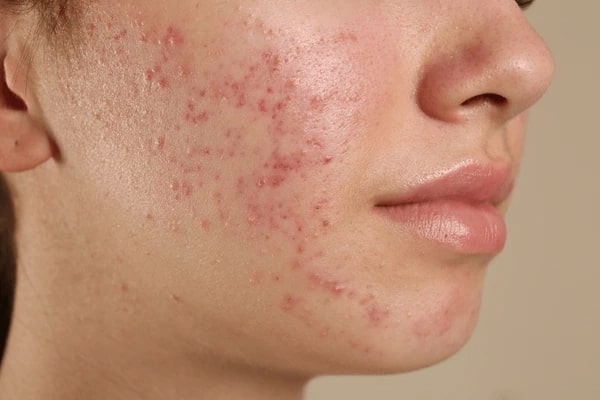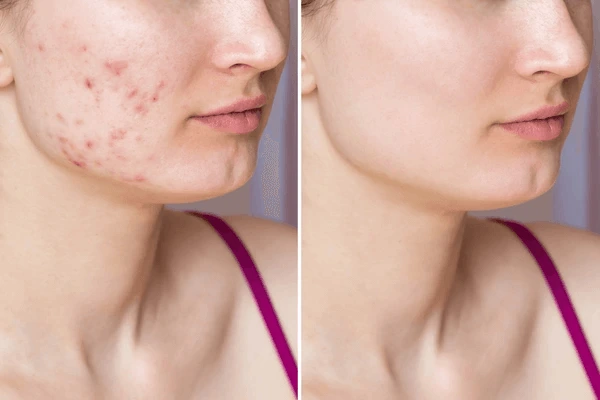Acne Treatment: What Works and What Doesn’t
Acne is a common skin condition that affects millions of people worldwide. From teenagers to adults, the appearance of acne can impact self-esteem and overall well-being.
Understanding what works and what doesn’t in acne treatment is essential for effective management.
Dr. Sweta Vijay Nakhawa, a leading cosmetologist, dermatologist, and aesthetician in Thane, specializes in providing advanced acne treatments tailored to individual needs.
This guide explores the causes, types, and treatment options for acne while addressing myths and preventive measures.

What is Acne?
Acne is a skin condition that occurs when hair follicles become clogged with oil, dead skin cells, and bacteria. It typically appears on the face, neck, back, and shoulders, areas where sebaceous (oil) glands are most active.
Types of Acne
Non-Inflammatory Acne
- Blackheads: Open clogged pores that appear dark due to oxidation.
- Whiteheads: Closed clogged pores that look white or flesh-colored.
Inflammatory Acne
- Papules: Small, red, raised bumps caused by inflamed or infected hair follicles.
- Pustules: Pimples with pus at the tips, often red and painful.
- Nodules: Large, hard, and painful lumps beneath the skin.
- Cystic Acne: Severe form of acne that results in deep, painful cysts and significant scarring.
How Common is Acne?
Acne is one of the most prevalent skin conditions globally. While it commonly affects teenagers due to hormonal changes during puberty, it can persist or occur for the first time in adulthood.
Research shows that nearly 85% of people experience acne at some point in their lives.
Symptoms of Acne
Common symptoms of acne include:
- Red, swollen pimples or lumps.
- Blackheads or whiteheads.
- Painful cysts under the skin.
- Scarring or discoloration from healed pimples.
What Causes Acne?
Hormonal Imbalances
- Increased androgen levels during puberty, pregnancy, or menstrual cycles stimulate oil production, leading to acne.
External Triggers
- Diets rich in sugar, dairy, or greasy foods.
- High-stress levels and lack of adequate sleep.
- Use of pore-clogging skincare or makeup products.
Genetics and Lifestyle Factors
- Family history plays a significant role in acne susceptibility.
- Poor personal hygiene or prolonged exposure to pollutants.
How is Acne Diagnosed?
Clinical Examination
Dermatologists typically diagnose acne based on the visible signs, severity, and patient’s medical history. Identifying the type of acne is crucial for selecting the appropriate treatment.
Additional Tests (If Needed)
In some cases, hormonal or allergy tests may be recommended to uncover underlying causes.
Acne Treatment in Thane
What Works?
Over-the-Counter Treatments
- Salicylic Acid: Helps unclog pores and reduce inflammation.
- Benzoyl Peroxide: Kills acne-causing bacteria and dries out excess oil.
Prescription Medications
- Topical Retinoids: Promote cell turnover and prevent clogged pores.
- Oral Antibiotics: Reduce inflammation and bacterial growth.
- Hormonal Treatments: Options like birth control pills or spironolactone regulate hormones.
Advanced Dermatological Procedures
- Chemical Peels: Remove the outer layer of skin to reduce acne scars and discoloration.
- Laser Therapy: Targets acne-causing bacteria and reduces oil production.
- Microdermabrasion: Exfoliates the skin to improve texture and minimize scarring.
What Doesn’t Work?
- Applying toothpaste on pimples.
- Over-washing or scrubbing the skin harshly.
- Unproven natural remedies without dermatological guidance.
Role of an Acne Treatment Surgeon in Thane
Dr. Sweta Vijay Nakhawa provides personalized acne treatment plans tailored to each patient’s skin type and acne severity. Her expertise ensures effective and lasting results.

How Can I Prevent Acne?
Daily Skincare Routine
- Use non-comedogenic cleansers and moisturizers.
- Wash your face twice a day to remove dirt and oil.
- Apply sunscreen to protect your skin from UV damage.
Lifestyle Modifications
- Maintain a balanced diet rich in fruits, vegetables, and water.
- Incorporate stress-relief techniques like yoga or meditation.
- Get at least 7-8 hours of sleep daily to aid skin repair.
Long-Term Strategies
- Avoid touching or squeezing pimples to prevent scars.
- Regularly clean makeup tools and pillowcases.
- Seek dermatological advice for persistent acne.
Conclusion
Acne can be frustrating, but effective treatments and preventive measures are available.
Consulting a specialist like Dr. Sweta Vijay Nakhawa can make all the difference in achieving clear, healthy skin. With advanced acne treatments offered in Thane, you can regain your confidence and address the root causes of your skin concerns.
Call to Action
Contact Dr. Sweta Vijay Nakhawa’s clinic today to book a consultation and explore advanced acne treatments in Thane. Take the first step toward healthier, blemish-free skin!
